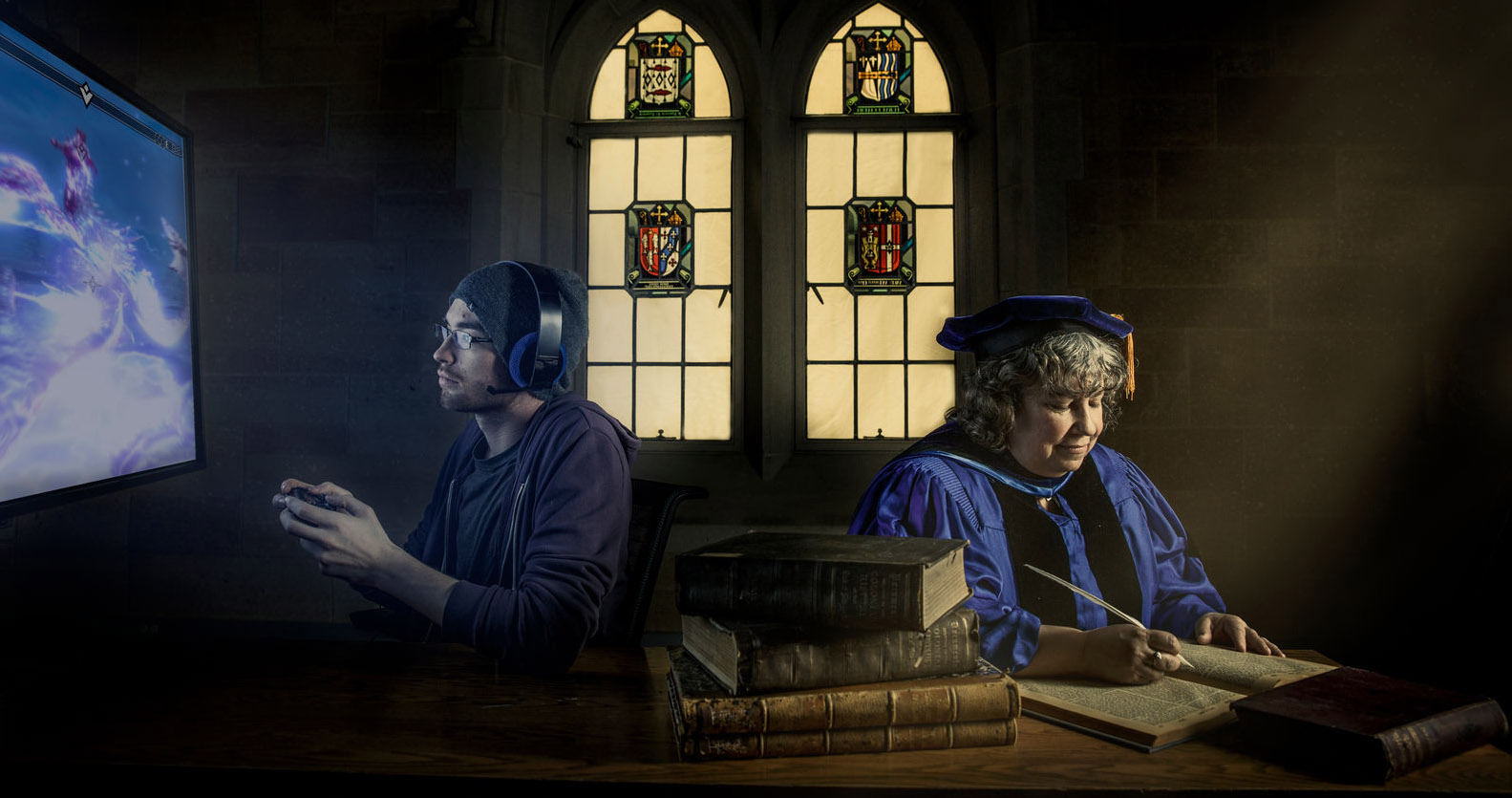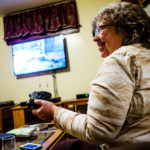
Mike Best and Corrine Carvalho are exploring the intersection of video games and theology. (Photos by Mike Ekern '02)
Dr. Corrine Carvalho and Mike Best have rituals for gaming. A rainy Monday in March saw them play out: Carvalho and Best stood in her kitchen, divvied up what she had made for dinner and discussed the night ahead.
“I was thinking we could play ‘Dark Souls,’” Carvalho prompted. “Dark Souls” might be a surprising video game name for a theology professor and an English major to bond over, but Carvalho and Best have done just that. They’ve spent the last two years as compatriots visiting different digital worlds.
Carvalho was working at “Dark Souls” on her own – a notoriously difficult game in which the player is an undead character whose task is to collect souls and succeed the former lord of that world – but she was stuck at a certain point and wanted Best’s advice.
They sat in their usual spots: Best in the recliner armchair, Carvalho on the couch. On the screen, Carvalho’s character approached a fortress only to trigger two soldiers with long, wobbly snake heads. Working the Xbox controller, Carvalho demonstrated her technique of luring the enemies to a corner. She was killed twice before she handed the controller to Best.
He put his dinner down, settled into the chair and popped up the footrest. Best was in his element: He flipped through Carvalho’s inventory, equipping her with a stronger weapon and better shield while choosing other inventory to allow the character to tuck and roll faster.
Throughout the night, they traded information and the controller back and forth as they headed deeper into the fortress. The scene probably isn’t one most people imagine when they think of faculty- student research, but Carvalho and Best transform their gaming sessions into academic essays, and are planning to write a book, by connecting video games and biblical studies.
Video games and theology?
Carvalho, who has taught theology at St. Thomas since 1996, was on a road trip with her son and his two friends when she decided she wanted to learn more about video game culture. The boys, who were about to start college, were playing games when they entered Wyoming.
“One of the kids said, ‘Wow! Look at this!’ He was all excited about the landscape,” Carvalho recalled. “Why? Because it looked like something from a video game.”
Watching the three interact with the game, each other and the world around them, Carvalho realized the narrative she often had heard about video gamers wasn’t correct.
So, she became curious about how she could harness that excitement and energy for her classes.
Best was in her Theology 101 class working to fulfill his theology requirement for graduation. While Best is a confirmed Catholic, he had lost interest in religion in high school and wasn’t exactly thrilled to take a theology class because he thought it would be “more Sunday school.”
But, while in Carvalho’s class, he “realized that people don’t necessarily have to be religious or be brought up in a religious household to benefit” from studying theology, Best said.
He decided he wanted to help other people find a way to appreciate theology and potentially connect with the Bible in new and interesting ways.
Breaking down video game stereotypes
Knowing Best had a strong background in video games, Carvalho asked that he mentor her. With the help of a St. Thomas Partnership-in-Learning grant, they began work in summer 2015 by playing “Dark Souls,” “Skyrim” and “BioShock,” among others, purposefully mixing console, PC and app games.
Critical to understanding their research is unraveling some of the negative stereotypes video gamers face. One of the primary notions Carvalho and Best are working against is the idea that students are “intellectually anesthetized” when they play games.

Far from glazing over, it was clear just how much Best’s and Carvalho’s brains worked while they played: Best calculated the weight of items Carvalho’s character was carrying and made decisions on the likelihood of needing them based on his previous knowledge of the game. Meanwhile, Carvalho approached beating the snake guards like a puzzle: If one technique didn’t work, she tried another until she found an approach that allowed her to progress. In that way, Carvalho pointed out, many games actually teach problem-solving skills.
Best added that those who are involved in gaming communities online often are posting, critiquing and analyzing games with one another, which can help develop a critical lens.
To dismiss the image of anti-social gamers, Carvalho and Best also noted how gamers interact with each other.
“Does this seem anti-social?” she asked as she and Best debated “Dark Souls” tactics.
Interacting with the Old Testament
While Carvalho had anticipated she would draw most comparisons between the themes of video games and the Old Testament, that hasn’t been the case. Instead, she and Best have focused on how people interact with the stories.
One of the ideas Carvalho has been exploring is how the experience of playing a video game is similar to how biblical stories would have been experienced in a primarily oral culture. For example, when a person plays a video game, the overarching story is always the same, but the way the player experiences it is slightly different depending on the decisions. The same could be true for a biblical story told aloud.
She also has written about Qoheleth (whom the book Ecclesiastes is about) and puzzle games, as well as a visionary temple described in Ezekiel 40-48 as a site for play, similar to a “Sims” or “Minecraft” virtual world. She has used video games such as “BioShock” and “Dark Souls” to discuss the appeal of dystopia in conjunction with Jeremiah.
Best has written about gender, including a piece on Judith and feminism; presented on video games as pedagogical tools; and conducted research on dystopia in video games and the Bible.
He recently wrote a paper for one of his classes about how the real-time strategy game “XCOM2” put him in a position analogous to God as he commanded a squadron of customizable soldiers from above – in a God-like position. Best’s strategy while he played was to funnel his resources to one particular soldier, which he had built to resemble himself. When that character abruptly was killed in the final bout, Best was thrown off balance. He experienced shame when he realized he valued that one soldier’s life above all others.
Using his theological lens over the game allowed him to critique his own behavior; he said that considering human issues like these are exactly what he believes theology is all about.
Connecting to students’ lived experiences
When Carvalho presented research at St. Edward’s University last fall, she found herself circled by undergraduates afterward.

No, seriously, they're actually studying.
“One student said, ‘My parents always told me not to play games. This just gives me hope, this connection with the Bible,’” Carvalho said. “It’s really giving words to their experience.”
And that is precisely why Carvalho thinks this work is important.
“I was trained by Jesuits, and Jesuits talk about theology within the culture, within the life of the people, within the lived experience of the people,” Carvalho said. “Our students’ experience is ‘Skyrim’ and ‘Dark Souls.’”
Among those who have been intrigued by their work is Catholic studies and theology major Daniel Furey. Carvalho presented some of her research at a St. Thomas Theology Club meeting, of which Furey is the service chair. Furey considers himself an avid video gamer and also would like to do academic work by analyzing video games from aesthetic and ethical perspectives., which he feels encouraged to do by Carvalho’s and Best’s work.
While Carvalho and Best admit that video gaming isn’t for everyone, Best pointed out that their work is just one potential tool for better understanding the abstract ideas of biblical and ancient texts.
“You never need fewer tools to address human issues, which is what we work on in theology,” Best said. “I would prefer more tools.”
While Carvalho and Best both have high hopes for how far their work may reach, they don’t lose sight of the love of gaming that brought them together in the first place: Once a week, they meet at Carvalho’s house. They hear new stories, defeat enemies, consider the nature of God and save worlds.
Read more from St. Thomas magazine.





